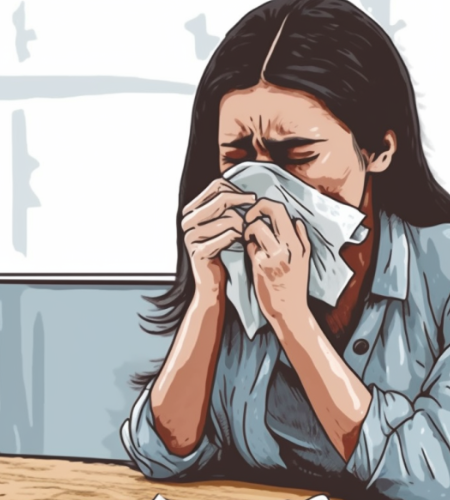Have you ever experienced a sinus infection? They can make you feel terrible. Your sinuses get swollen and clogged up, which leads to pain, pressure, and congestion. You might ask yourself if sinus infections can spread to others, especially if someone near you gets one right after you do. Let’s explore sinus infections, what makes them happen, and whether they are contagious.
What Are Sinus Infections?
Your nose has spaces called sinuses. Sometimes they get angry and puffed up. This is called a sinus infection. It also has another name – sinusitis.
Most times, a sinus infection happens because of a virus. It can come with a cold or flu. If it’s from a virus, the sinus infection usually goes away in 7 to 10 days without needing medicine.
Not as often, bacteria cause a sinus infection. It is a bacterial sinus infection if you have symptoms for more than ten days.
What Symptoms Can Indicate a Sinus Infection?
Viral and bacterial sinus infections can make you feel lousy similarly. You’ll likely experience pain, pressure, or fullness in your face. Your nose gets all stuffed up and congested. You may also have a runny nose. Losing your sense of smell is common too. Coughing, sore throat, fever, bad breath, and just feeling worn out and tired are other classic signs.
All these symptoms tend to come on fast in an acute sinus infection that lasts less than four weeks. But in a chronic sinus infection, the symptoms stick around for over 12 weeks or return repeatedly. Whatever the cause, sinus infections make you pretty miserable until you can clear them up.
Causes of Sinus Infections
The following are the causes of sinus infections:
Viruses
The viruses that cause colds and flu are typically the culprit behind viral sinus infections. The same viruses that infiltrate your nasal passages and throat can also affect the sinuses, leading to inflammation and swelling that blocks the sinuses. This causes mucus and fluid buildup, pain, and pressure.

Bacteria
While viruses are the more common cause, bacteria can sometimes invade the sinuses and lead to infection. The sinus cavities are ordinarily sterile, so bacteria carried in mucus get trapped in the blocked sinuses and multiply, causing a bacterial infection.
Other factors: Anything that causes sinus swelling or blocks mucus drainage can set the stage for a sinus infection. It includes:
- Allergies – Allergic rhinitis can cause chronic inflammation.
- Structural problems – Things like a deviated septum, nasal polyps, or tooth infections can block sinus drainage.
- Smoking – The chemicals and irritation from smoke inflame the sinus linings.
- Pollution and dust – Irritants in the air can cause inflammation and swelling.
Are Sinus Infections Contagious?
The short answer is no. Sinus infections themselves do not spread from one person to another. But the germs that cause some sinus infections can be transmitted. Let’s look at infections from viruses versus bacteria:
Viral sinus infections
The viruses that cause many sinus infections spread very easily. Colds, flu, RSV, and other bugs pass through coughs, sneezes, or close contact with a sick person.
Bacterial sinus infections
These do not spread at all. The bacteria behind bacterial sinusitis do not go from one person to another. But you could give someone a virus or bacteria that later causes them to get a bacterial sinus infection. For example, you could pass a virus to a family member that makes them get a bacterial sinus infection while you only have a cold. Still, the sinusitis did not directly spread.
While sinus infections don’t spread, the germs that contribute to them are highly contagious. You can’t “catch” a sinus infection from sitting in a draft, going out with wet hair, using a humidifier, or drinking cold drinks. Sinus infections come from germs swelling the nasal passages, not getting cold or wet.
Who is at Risk for Contagious Infections Leading to Sinusitis?
While sinus infections don’t spread between people, anyone can pick up a contagious viral or bacterial illness that could cause sinusitis. However, some individuals are at greater risk:
- People with weakened immune systems – Those with conditions like HIV/AIDS or taking immunosuppressant medications may get more frequent or severe sinus infections following a viral illness.
- Young children – Kids have developing immune systems and less prior viral exposure. Daycares and schools can facilitate the transmission of colds.
- Healthcare workers – Frequent exposure to contagious illnesses puts them at higher risk.
- Those with allergies or nasal/sinus structural issues – Any swelling or blockage makes developing an infection easier.
How Can You Prevent Spreading Germs That Cause Sinus Infections?
Sinus infections can’t be passed to others, but the viruses and bacteria causing them can spread. Keep good hygiene to stay safe.
Be sure to wash your hands often, incredibly when sick. Disinfect shared surfaces like doorknobs, counters, keyboards, etc., to kill lingering germs. Try to avoid close contact with people who are ill if possible. Always cover up coughs and sneezes to contain those respiratory droplets that can spread infection. If you feel sick, do your colleagues a favor and stay home from school or work when possible.
Here’s another biggie regarding stopping the spread – ensure you’re up to date on your shots! We’ve got vaccines for some of the top virus troublemakers that can lead to sinus infections, like the flu and RSV.
Ask your doc about getting these recommended immunizations, especially if you’re in one of the high-risk groups for complications. Keeping your vaccines, current helps boost your immune system’s defenses and builds a shield of protection at the community level to prevent these sneaky bugs from spreading and causing infection.
Getting your shots helps safeguard the little ones, elderly folks, expectant mothers, and those with weakened immunity who can get slammed hard by nasty illnesses. So doing your part and getting vaccinated against the contagious culprits is a smart, caring choice for everyone’s health.
How can Sinus Infections Caused by Contagious Viruses be Treated?
Luckily, most sinus infections caused by viruses go away within 7-10 days without needing treatment specifically for sinusitis. You can help ease your misery during that time in some simple ways.
Warm compresses on your face and using humidifiers can provide relief too. Over-the-counter pain pills like acetaminophen can alleviate headaches and facial pressure.
Saline nasal sprays and irrigation help flush out congestion. And avoiding irritants like cigarette smoke or strong scents can prevent further inflammation. But if your symptoms haven’t improved after ten days, see your doctor.
The Bottom Line
Sinus infections themselves don’t spread from person to person. But the viruses and bacteria behind them are contagious. So while you can’t directly “catch” someone’s sinusitis, you can pick up the bug that causes it.
Be diligent about handwashing, covering coughs, and avoiding sick people. Most viral sinus infections resolve themselves. But seek medical care if symptoms last over ten days since antibiotics may be needed for bacterial sinusitis.
Stay healthy to keep sinus misery from spreading!
I hope so you enjoy our article, do check out more of our amazing articles.
